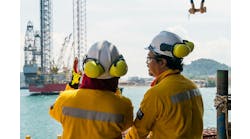BRAZIL IS THE HOME of the second (Sao Paulo) and ninth (Rio de Janeiro) largest cities in the world, and has a GNP of more than the $780 billion (1998 figure).
According to Pedro Biondo, Marketing Director of Smar, Brazil is the world's second-largest market for things as disparate as cellphones and executive jets and helicopters. Its market for washing machines is 82% larger than Canada's. Brazilians buy 456% more toothpaste than Italians do. And Brazil has 4,612 ISO 9000-certified companies; two orders of magnitude larger than any other Central or South American country.
Smar is the only Latin American automation company to have made it in the world market. Smar is about $7080 million in revenues, with between $1520 million from the U.S. (divided between Smar International and Smar Research). Their market lead in fieldbus technology (their Smar Research Ltda division makes silicon for lots of other automation companies' fieldbus products) and their R&D budget have made them a powerhouse in Brazil, throughout Latin America and in Asia. Smar is well known for pressure transmitters and Foundation fieldbus (FF), but what is not so well known is their density measurement systems and the fact that they can do complete control systems with software they private label from Iconics. Smar's position as a Brazilian company, coupled with its technology lead in Foundation Fieldbus design, means that Brazil is one of the most fieldbus-enabled countries in the world.
An example of this is the Santa Eliza sugar mill. The mill is completely integrated. They bring in the cane and crush it. Then they take the cane and burn it in the boilers and make steam to run the sugar refinery, and the rest of the steam is used to run the 60-MW steam turbines that power the plant and furnish power back to the grid. The bagasse (the ground up cane) is stored, sold to other sugar mills, and some of it is mixed with red clay from the clarifiers, made into cake, and used to re-fertilize the cane fields.
The mill makes sugar from about 50% of the cane liquor, and the other 50% is used to make "alcool" or ethanol. They produce hydrous ethanol for vehicle fuel, anhydrous ethanol, and "super high test" ethanol for drug companies. They get the best yield from their advanced molecular sieve process. Santa Elizas control rooms and all the control systems are among the most modern in the world, and the newest part of the plant is all Foundation fieldbus HSE. There are well over 200 FF transmitters in Santa Eliza.
Petrobras, the Brazilian state oil company, like other large multinational oil producer companies, is trying to optimize production, and to modernize their facilities. Currently they are producing a 21st century automation schema to carry them through the next two decades.
Petrobras is in the middle of a fairly hot political issue about where to build a new refinery. Some people want them to buy/build a new refinery in the U.S., and others want the new refinery built in Brazil. Of course, the various state governments in Brazil are now fighting over where in Brazil it should be built.
Petrobras appears to be making kerosene, jet fuel, diesel, and some other things at the transfer station Editor in Chief Walt Boyes visited. Perhaps Petrobras has decided to go ahead and expand an existing facility rather than continue to have the politics interfere. It would take little effort to begin refining gasoline there.



